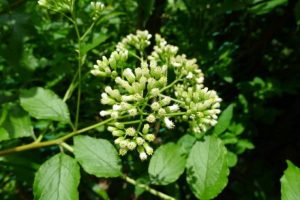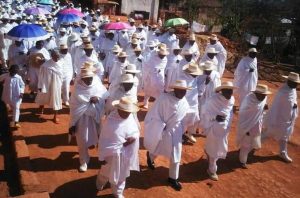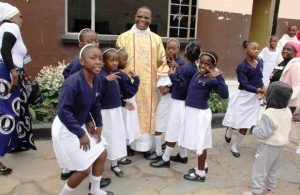Fighting between government (SPLA) and armed opposition (SPLA-IO), forces in and around South Sudan’s Kajo-Keji County have made more than 100,000 people to flee to Uganda. Tens of thousands are living as internally displaced persons (IDPs), near the border between the two countries.
As conflict intensified in the area early this year, much of Kajo-Keji’s population left for security in the districts of Moyo, Adjumani, Yumbe and Arua. Around 25,000 people are internally displaced in the bordering Ugandan districts of Moyo, Yumbe and Yei County in South Sudan, in a rebel-controlled area. Here is the testimony of Comboni Missionary, Father James Komakech Kenyi.
This unsettled situation forced even the Comboni missionaries, who evangelise in Kajo-Keji area, to move out into Uganda and re-settle near Moyo district from where they offer pastoral assistance to the refugee communities. The 25,000 citizens who remained displaced inside South Sudan, however, had no pastoral assistance at all for about five months. They had been cut off and had no access to their chapels.
There are Catholics and non-Catholics alike in desperate need of a peaceful environment, spiritual nourishment, education, and healthcare among other needs. Towards the end of May 2017, I joined a pastoral team from Moyo that decided to visit these internally displaced communities. This could turn out to be a very difficult endeavour given the harsh environment and hostile political and insecure situation in the area.
Our team drove for about 50 kilometres from Moyo towards South Sudan on a very rough road, but failed to reach the war-displaced communities on that day. It was only in mid-June that we managed to enter South Sudan’s Kajo-Keji through Yumbe and Liwolo, after a long 100 kilometres driving from Moyo mission to the settlement of the internally displaced persons.
We met no animosity on the way and, since we were on a pastoral visit, the border was kindly opened and no demands were made. We felt we were back into our missionary area.
It was a moving experience to meet those displaced people. The Christians had improvised a chapel under a tree. There they make their prayers and sing songs of praise and hope. This makes them look to the future of South Sudan with hope, despite the hard situation they are in. As a South Sudanese, I must say that the experience gave me some more hope too.
The IDPs chairperson kindly introduced us to the local authorities. The commissioner, who resides a distance of some 11 kilometres away from the IDPs communities, shared some information about the communities and we explained the reasons of our pastoral visit. In the meeting with the communities, people were given time to express how they feel and their needs. Basically, they pointed out a lack of shelter during the raining season, no schools for their children, whom they expect to be the future of South Sudan, not enough food, limited clean water, poor accessibility and road surfaces and need of more health facilities.
They also requested more spiritual support, which is certainly a powerful dose of consolation and hope, particularly at this moment of suffering and loss they are going through. We did get the impression that people seem to feel more secure in this area. In fact, we heard no reports of rapes, looting, tortures and killings. Obviously, these communities do not feel as safe as before, but they did say that at least the armed forces around them are not raping their women, torture and kill their people.
The commissioner claimed that his movement is committed to defend citizens and to get true justice, peace and reconciliation done in the country. Their struggle would be to make inclusivity to prevail over a one-tribe establishment and to help their brothers and sisters, who are refugees in Uganda, Ethiopia, Sudan, Kenya, Chad and D. R. of Congo, and displaced within the country, to return to their homes safely and peacefully and to build the nation.
This portion of the South Sudan population does not seem to be in agreement with the division of Kajo-Keji County into three smaller counties. For them, this would be illegal and they still regard Kajo-Keji as one single county with only five Payams without any further division. They have reported that a UNMISS team has attempted to enter their area, but faced a lot of obstacles placed by the government of South Sudan. An assessment had been made but humanitarian aid transported through Uganda would not be allowed in.
There is a general feeling among these people that the government of South Sudan would regard the war-displaced communities living in Kajo-Keji rebel-controlled areas as rebels too. The communities would disagree. We have witnessed that these war-displaced communities are civilians living in a very difficult situation and victims of the ongoing conflict in South Sudan.
With this pastoral visit, we have been able to assess their situation and have found that they have been given some support. The churches are among those helping them. However, there are still a lot of needs to be met. Among their basic needs are lack of scholastic materials, better health care, counselling, food, farming tools, and spiritual support.
It was a touching experience for me to join this team on a pastoral visit to war-displaced South Sudanese communities in Kajo-Keji. It provided me with a unique occasion to meet, talk and encourage them. It was also shocking and traumatising to see them live in such a hopeless and distressing situation. Indeed it is very sad to see people struggling to survive in a conflict generated by political disagreement and power struggle. All the beautiful dreams and hopes of the energetic young South Sudanese have slowly disappeared. These 25,000 war-displaced persons are left with some hope for a better South Sudan, but not that much.






